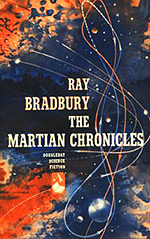
![]() Triseult
Triseult
6/10/2012
![]()
There are SF books that age superbly well, staying relevant and believable decades beyond their publication dates. The Martian Chronicles is not such a book; it's a delicate antique, the fossilized remains of dreams and terrors gone by, of a time when Mars had water irrigation canals, and everyone feared death by atomic war. It may not have remained relevant, but its lyrical beauty is intact.
Martian Chronicles is a series of loosely connected short stories set on the planet Mars; more specifically, on the planet Mars as it existed in the collective consciousness of the 1950s, when the lines slashed across its surface were water canals built by an ancient and alien civilization. In 2012, it reads not so much as science fiction, but as a form of dreamy fantasy, an alternate universe where the science fiction dreams of the Martian wild frontier are true. This gives a charming air of naïveté to the stories, a nostalgia of dreams gone by, made impossible by the images sent back by Viking and Pathfinder.
There exists a quaint notion in the public's mind that a SF author's greatness can be measured by his or her power to predict the future: much attention is given to Asimov anticipating the Laws of Robotics, or of Arthur C. Clarke having predicted orbital satellites. But reading The Martian Chronicles, it's obvious that great SF writers do not so much try to anticipate and predict the future, but rather dream of all possible futures.
That's what the stories in The Martian Chronicles feel like; a dream. They possess a dreamy, ethereal quality, the descriptions filled with a deep sense of wonder and joy at the Universe, a lyricism and poetry that depart in a formidable fashion from the dry intellectualism of Bradbury's contemporaries at the time. The stories themselves are enchanting, sometimes gripping; they never grow grim, even if they deal with death, yearning, sometimes murder, sometimes outright war. Some of the stories present arresting imagery to this day: the sight of all African Americans, having given up on ever being granted full civil rights, gathering their belongings and leaving for Mars; or the clockwork rhythms of an automated house, calling the children to breakfast long after Earth has died in an atomic war.
My biggest gripe with Martian Chronicles is the fate of the Martians themselves, and the relative lack of empathy given to what Bradbury imagined as beautiful, wise creatures. Their fate mirrors that of Native Americans, and perhaps because the novel was of its time, their destruction under the relentless wheels of colonization did not stir much sympathy in Mr. Bradbury. There was a huge opportunity to discuss the human/Martian cost of the American spirit of endeavor, but this is a theme which Mr. Bradbury has preferred should remain untouched.
On a personal note, I began reading The Martian Chronicles on June 5th, 2012, unaware that Mr. Bradbury had passed away on that very day. By a strange twist of fate, despite having grown up with SF stories, I had never read any book by Mr. Bradbury before. I'm glad I finally, if a bit too late, learned to appreciate the greatness of his writings, and why so many authors consider him an inspiration.
When Mr. Bradbury passed away, Humanity has lost a dreamer. But judging by the beauty and grace of this book, the dreamer's dreams live on.